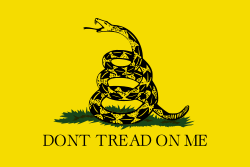Rick Santelli
| Rick Santelli | |
|---|---|
| Born |
January 12, 1953[1] Chicago, Illinois, U.S. |
| Occupation | CNBC commentator, derivatives trader |
Rick Santelli is an editor for the CNBC Business News network.[2] He joined CNBC as an on-air editor on June 14, 1999, reporting primarily from the floor of the Chicago Board of Trade. He was formerly the vice president for an institutional trading and hedge fund account for futures-related products. He is also credited with being a catalyst in the early formation of the Tea Party movement via a statement he made on February 19, 2009.[3]
Early life
The grandson of four Italian immigrants, Santelli was born near Taylor Street in Chicago's old Italian neighborhood and at age 6 moved with his family to Lombard, Illinois. After graduating from Willowbrook High School in Villa Park, Illinois, Santelli graduated from the University of Illinois at Urbana-Champaign[2] and was a member of the Alpha Sigma Phi fraternity.
Career
In the early 1980s Santelli got an up-close-and-personal education in futures trading, foreign exchange and customer relations from his then mentor and employer, RJ Abrams. Abrams filled customer orders in the Japanese Yen pit at the Chicago Mercantile Exchange for all the major brokerage houses, most of which no longer exist. Santelli's job was to keep customer orders, mostly entered on paper via Telex machines arranged according to price and to interface with customers.
Financial
After graduation in 1979, he joined the Chicago Mercantile Exchange and the Chicago Board of Trade as a commodity trader and order filler for Drexel Burnham Lambert; he eventually became the Vice President of Interest Rate Futures and Options.[2]
Media
In the 1990s, Santelli felt that the financial industry was changing in a way "not beneficial to me and my family",[4] and accepted a full-time job with CNBC in 1999.[2]
Political and economic views
"Chicago Tea Party" remarks
Santelli drew attention for his remarks made on February 19, 2009, about the Homeowners Affordability and Stability Plan, which was announced on February 18. While broadcasting from the floor of the Chicago Mercantile Exchange, Santelli accused the government of "promoting bad behavior", and raised the possibility of a "Chicago Tea Party". He suggested that individuals who knowingly obtained high-risk mortgages (and faced impending foreclosure as a consequence) were "losers".[5] The Tea Party remark was credited by some as launching the Tea Party movement.[6][7]
Responses
Santelli later clarified his comments and addressed concerns that the event was staged.[8][9]
On April 20, 2009, Santelli participated as a panel member in an Economic Leadership Forum hosted by the George Bush Presidential Library Foundation at Texas A&M University.[10]
CNN.com reported that some compared Santelli to fictional reporter Howard Beale, the protagonist of the 1976 satirical film Network.[11] Santelli said:
I think that this tea party phenomenon is steeped in American culture and steeped in the American notion to get involved with what's going on with our government. I haven't organized. I'm going to have to work to pay my taxes, so I'm not going to be able to get away today. But, I have to tell you – I'm pretty proud of this.[12]
Santelli's comments also garnered praise from libertarians. Mark R. Crovelli wrote:
In the world of financial "journalism," CNBC's Rick Santelli stands out as a refreshing and intelligent antidote to the hordes of perma-bulls, fed apologists, and chart sorcerers that otherwise pollute the financial airwaves. ... The trouble with Santelli, however, is that his political and economic philosophy is inconsistent and incomplete, and does not offer a viable alternative to that being peddled by his Keynesian opponents.[13]
Santelli has also been criticized by the left; for example, George Monbiot said "it is the most alarming example of cheap demagoguery you are likely to have seen."[14] Paul Krugman said:
...Somehow, [the Republican Party] has become infected by an almost pathological meanspiritedness, a contempt for what CNBC's Rick Santelli, in the famous rant that launched the Tea Party, called "losers." If you're an American, and you're down on your luck, these people don't want to help; they want to give you an extra kick....[7]
Personal life
Santelli lives with his wife and three daughters in Chicago's western suburbs near Wheaton, Illinois.[1]
References
- 1 2 Rosenthal, Phil (2009-02-23). "Rant raises profile of CNBC on-air personality Rick Santelli". chicagotribune.com. Retrieved 2009-03-02.
- 1 2 3 4 "Rick Santelli Profile, Biography, About". CNBC.com. 2006-11-28. Retrieved 2009-02-21.
- ↑ Fed-Bashing Three Ways Slate.com, Bethany McLean. November 9, 2010
- ↑ Ahrens, Frank (2008-11-23). "Five questions for CNBC's Rick Santelli". washingtonpost.com. Retrieved 2009-03-03.
- ↑ Etheridge, Eric (February 20, 2009). "Rick Santelli: Tea Party Time". New York Times: Opinionator.
- ↑ Pallasch, Abdon M. (September 19, 2010). "'Best 5 minutes of my life'; His '09 CNBC rant against mortgage bailouts for 'losers' ignited the Tea Party movement". Chicago Sun-Times. p. A4.
- 1 2 Krugman, Paul (July 14, 2013). "Hunger Games, USA". New York Times.
- ↑ Santelli, Rick (2009-03-02). "Rick Santelli: I Want to Set the Record Straight". cnbc.com. Retrieved 2009-03-03.
- ↑ Bauder, David (2009-03-02). "CNBC: Santelli not tied to political Web site". Retrieved 2012-04-27.
- ↑ "Bush To Host Economic Leadership Forum". tamunews.tamu.edu. 2009-04-09. Retrieved 2009-09-26.
- ↑ Nationwide 'tea party' protests blast spending. By Ashley Fantz. CNN.com Published April 15, 2009.
- ↑ Fox teas up a tempest. By Michael Calderone. The Politico. Published April 15, 2009.
- ↑ Crovelli, Mark R. "The Trouble With Rick Santelli". LewRockwell.com.
- ↑ Monbiot, George (2012-06-14). "Bogus, Misdirected and Effective". Retrieved 2013-12-12.
External links
- Rick Santelli bio on CNBC.com
- Original speech by Rick Santelli on CNBC.com
- Santelli's speech and White House response
